Analysis of Global Trade's Impact on Business and Strategy in UAE
VerifiedAdded on 2022/09/27
|15
|4715
|25
Report
AI Summary
This report delves into the multifaceted aspects of global trade and its profound influence on organizational strategies and behaviors. It begins by examining the impact of globalization and international trade on a case study organization, considering factors such as the introduction of VAT in Saudi Arabia and the upcoming Expo 2020 in Dubai. The report then analyzes the role of economic groups like OPEC in restricting trade and influencing oil prices, particularly affecting countries in the GCC region. Furthermore, it explores how international trade relations and government regulations impact the supply of products, labor, services, and materials across various industries, including retail and airlines. The report also investigates the transformative role of the internet in global trade, evaluating its effects on different sectors like healthcare and agriculture, and analyzes its impact on specific companies. The report provides a critical assessment of the internet's effects on two companies, and discusses policies used by companies to manage shifts in trade and overcome barriers. Finally, the report offers a conclusion summarizing the key findings and insights gained throughout the analysis.
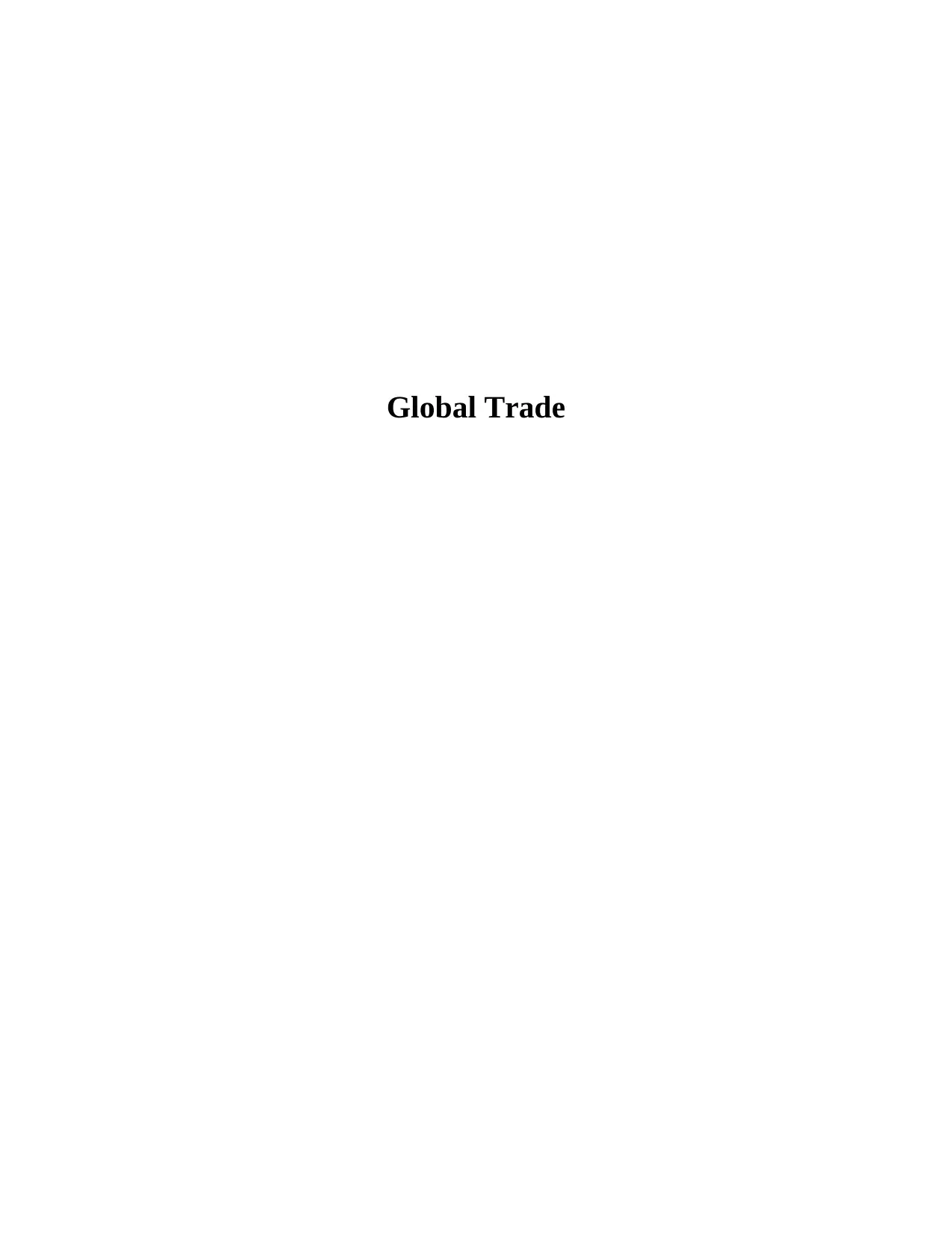
Global Trade
Paraphrase This Document
Need a fresh take? Get an instant paraphrase of this document with our AI Paraphraser
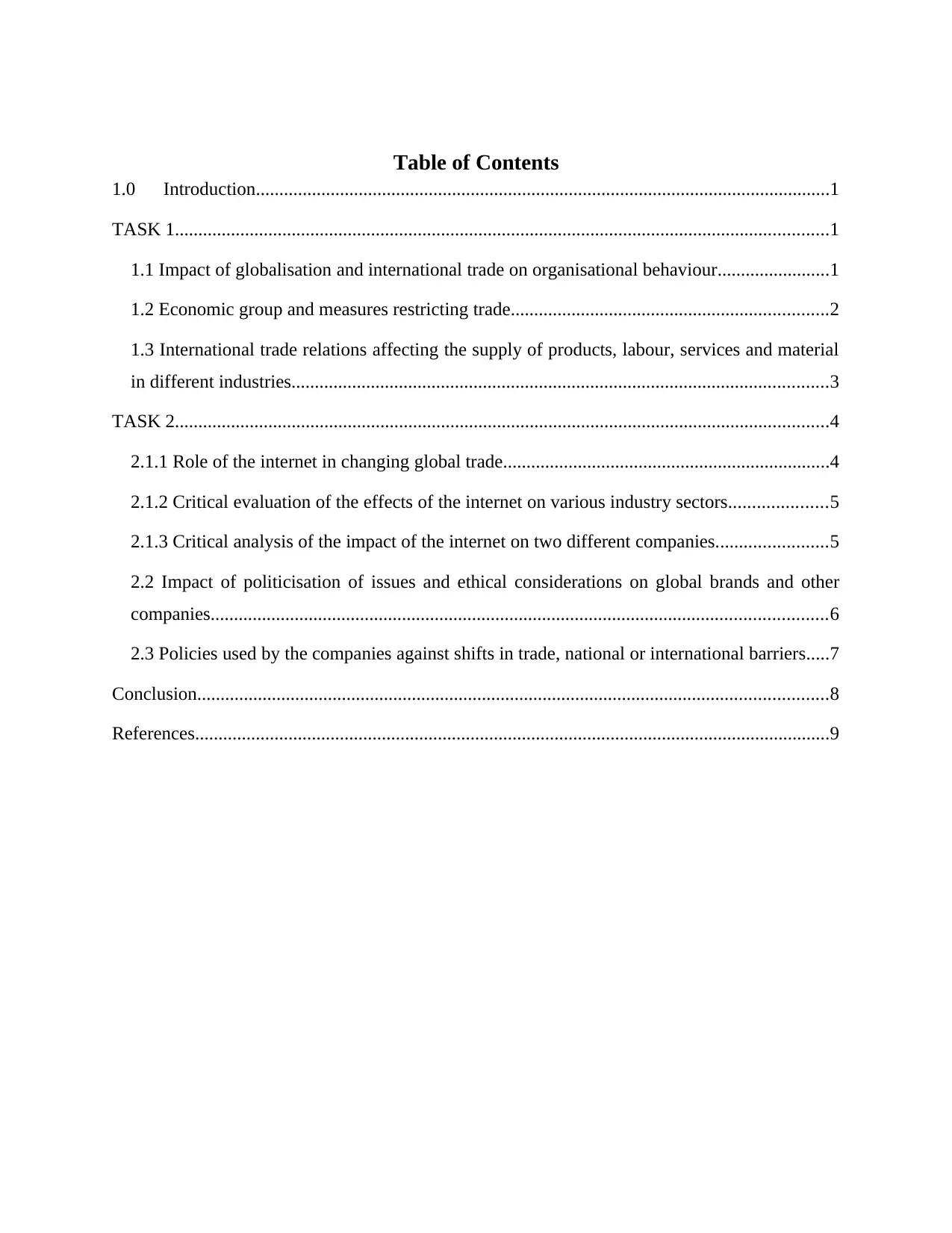
Table of Contents
1.0 Introduction...........................................................................................................................1
TASK 1............................................................................................................................................1
1.1 Impact of globalisation and international trade on organisational behaviour........................1
1.2 Economic group and measures restricting trade....................................................................2
1.3 International trade relations affecting the supply of products, labour, services and material
in different industries...................................................................................................................3
TASK 2............................................................................................................................................4
2.1.1 Role of the internet in changing global trade......................................................................4
2.1.2 Critical evaluation of the effects of the internet on various industry sectors.....................5
2.1.3 Critical analysis of the impact of the internet on two different companies........................5
2.2 Impact of politicisation of issues and ethical considerations on global brands and other
companies....................................................................................................................................6
2.3 Policies used by the companies against shifts in trade, national or international barriers.....7
Conclusion.......................................................................................................................................8
References........................................................................................................................................9
1.0 Introduction...........................................................................................................................1
TASK 1............................................................................................................................................1
1.1 Impact of globalisation and international trade on organisational behaviour........................1
1.2 Economic group and measures restricting trade....................................................................2
1.3 International trade relations affecting the supply of products, labour, services and material
in different industries...................................................................................................................3
TASK 2............................................................................................................................................4
2.1.1 Role of the internet in changing global trade......................................................................4
2.1.2 Critical evaluation of the effects of the internet on various industry sectors.....................5
2.1.3 Critical analysis of the impact of the internet on two different companies........................5
2.2 Impact of politicisation of issues and ethical considerations on global brands and other
companies....................................................................................................................................6
2.3 Policies used by the companies against shifts in trade, national or international barriers.....7
Conclusion.......................................................................................................................................8
References........................................................................................................................................9
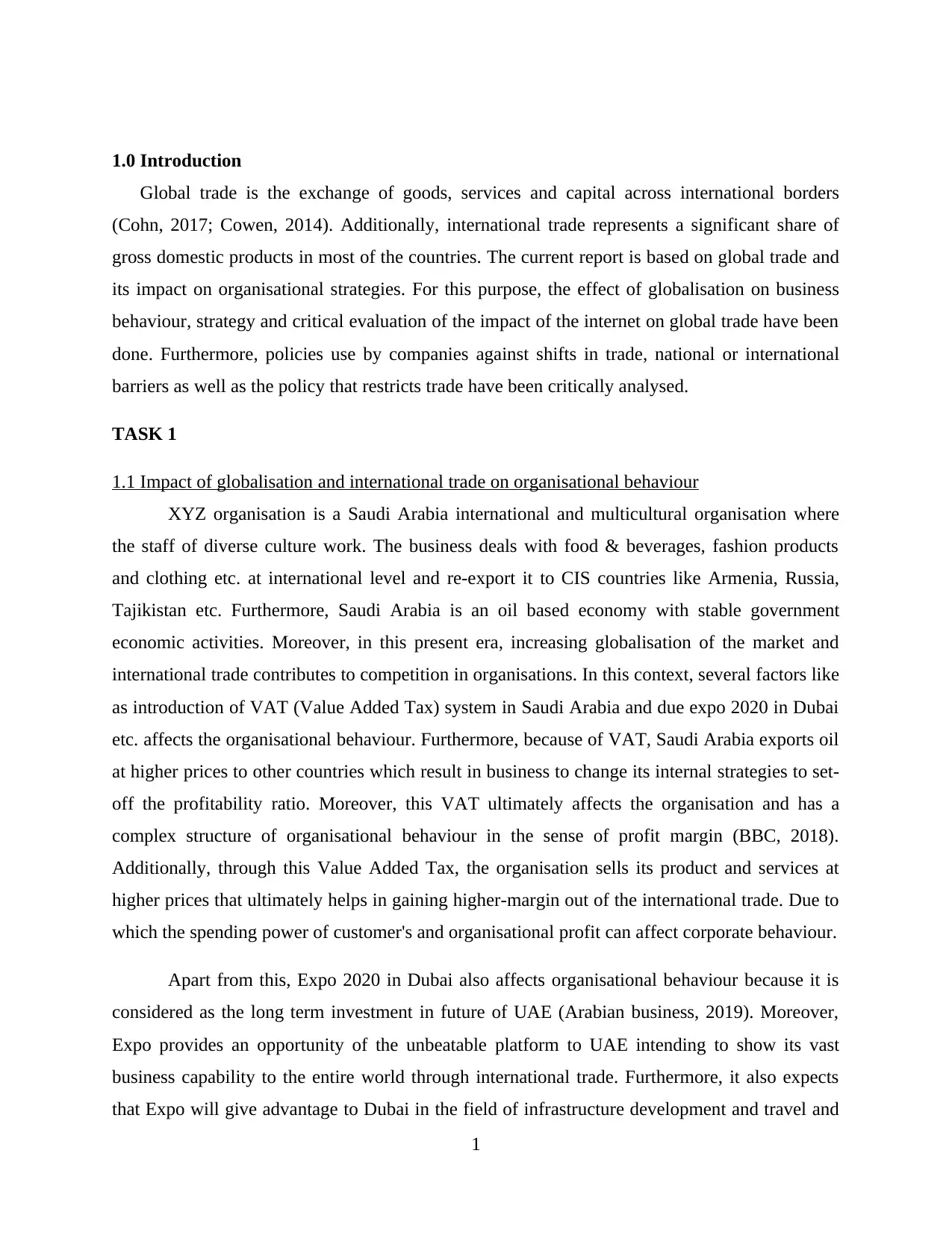
1.0 Introduction
Global trade is the exchange of goods, services and capital across international borders
(Cohn, 2017; Cowen, 2014). Additionally, international trade represents a significant share of
gross domestic products in most of the countries. The current report is based on global trade and
its impact on organisational strategies. For this purpose, the effect of globalisation on business
behaviour, strategy and critical evaluation of the impact of the internet on global trade have been
done. Furthermore, policies use by companies against shifts in trade, national or international
barriers as well as the policy that restricts trade have been critically analysed.
TASK 1
1.1 Impact of globalisation and international trade on organisational behaviour
XYZ organisation is a Saudi Arabia international and multicultural organisation where
the staff of diverse culture work. The business deals with food & beverages, fashion products
and clothing etc. at international level and re-export it to CIS countries like Armenia, Russia,
Tajikistan etc. Furthermore, Saudi Arabia is an oil based economy with stable government
economic activities. Moreover, in this present era, increasing globalisation of the market and
international trade contributes to competition in organisations. In this context, several factors like
as introduction of VAT (Value Added Tax) system in Saudi Arabia and due expo 2020 in Dubai
etc. affects the organisational behaviour. Furthermore, because of VAT, Saudi Arabia exports oil
at higher prices to other countries which result in business to change its internal strategies to set-
off the profitability ratio. Moreover, this VAT ultimately affects the organisation and has a
complex structure of organisational behaviour in the sense of profit margin (BBC, 2018).
Additionally, through this Value Added Tax, the organisation sells its product and services at
higher prices that ultimately helps in gaining higher-margin out of the international trade. Due to
which the spending power of customer's and organisational profit can affect corporate behaviour.
Apart from this, Expo 2020 in Dubai also affects organisational behaviour because it is
considered as the long term investment in future of UAE (Arabian business, 2019). Moreover,
Expo provides an opportunity of the unbeatable platform to UAE intending to show its vast
business capability to the entire world through international trade. Furthermore, it also expects
that Expo will give advantage to Dubai in the field of infrastructure development and travel and
1
Global trade is the exchange of goods, services and capital across international borders
(Cohn, 2017; Cowen, 2014). Additionally, international trade represents a significant share of
gross domestic products in most of the countries. The current report is based on global trade and
its impact on organisational strategies. For this purpose, the effect of globalisation on business
behaviour, strategy and critical evaluation of the impact of the internet on global trade have been
done. Furthermore, policies use by companies against shifts in trade, national or international
barriers as well as the policy that restricts trade have been critically analysed.
TASK 1
1.1 Impact of globalisation and international trade on organisational behaviour
XYZ organisation is a Saudi Arabia international and multicultural organisation where
the staff of diverse culture work. The business deals with food & beverages, fashion products
and clothing etc. at international level and re-export it to CIS countries like Armenia, Russia,
Tajikistan etc. Furthermore, Saudi Arabia is an oil based economy with stable government
economic activities. Moreover, in this present era, increasing globalisation of the market and
international trade contributes to competition in organisations. In this context, several factors like
as introduction of VAT (Value Added Tax) system in Saudi Arabia and due expo 2020 in Dubai
etc. affects the organisational behaviour. Furthermore, because of VAT, Saudi Arabia exports oil
at higher prices to other countries which result in business to change its internal strategies to set-
off the profitability ratio. Moreover, this VAT ultimately affects the organisation and has a
complex structure of organisational behaviour in the sense of profit margin (BBC, 2018).
Additionally, through this Value Added Tax, the organisation sells its product and services at
higher prices that ultimately helps in gaining higher-margin out of the international trade. Due to
which the spending power of customer's and organisational profit can affect corporate behaviour.
Apart from this, Expo 2020 in Dubai also affects organisational behaviour because it is
considered as the long term investment in future of UAE (Arabian business, 2019). Moreover,
Expo provides an opportunity of the unbeatable platform to UAE intending to show its vast
business capability to the entire world through international trade. Furthermore, it also expects
that Expo will give advantage to Dubai in the field of infrastructure development and travel and
1
⊘ This is a preview!⊘
Do you want full access?
Subscribe today to unlock all pages.

Trusted by 1+ million students worldwide
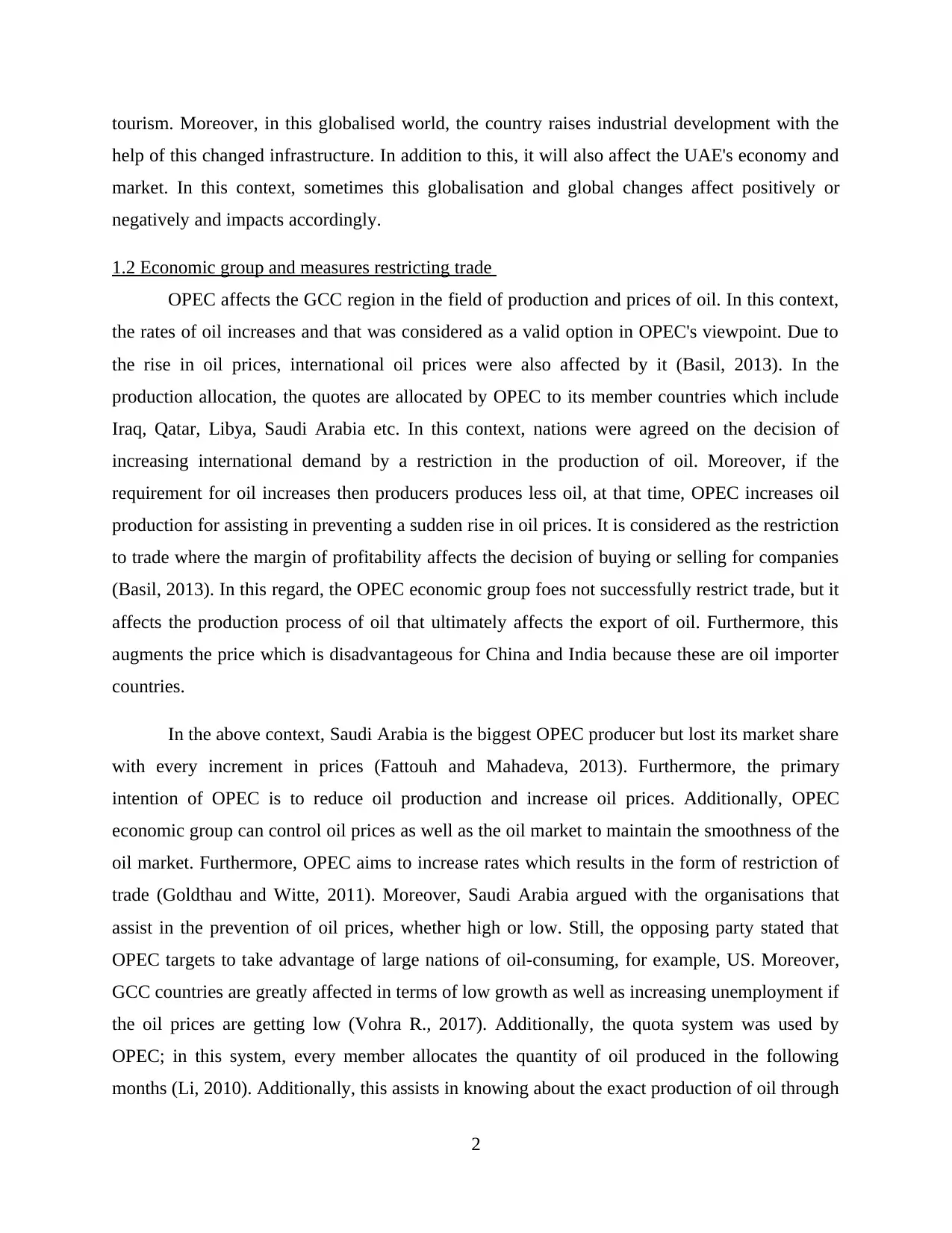
tourism. Moreover, in this globalised world, the country raises industrial development with the
help of this changed infrastructure. In addition to this, it will also affect the UAE's economy and
market. In this context, sometimes this globalisation and global changes affect positively or
negatively and impacts accordingly.
1.2 Economic group and measures restricting trade
OPEC affects the GCC region in the field of production and prices of oil. In this context,
the rates of oil increases and that was considered as a valid option in OPEC's viewpoint. Due to
the rise in oil prices, international oil prices were also affected by it (Basil, 2013). In the
production allocation, the quotes are allocated by OPEC to its member countries which include
Iraq, Qatar, Libya, Saudi Arabia etc. In this context, nations were agreed on the decision of
increasing international demand by a restriction in the production of oil. Moreover, if the
requirement for oil increases then producers produces less oil, at that time, OPEC increases oil
production for assisting in preventing a sudden rise in oil prices. It is considered as the restriction
to trade where the margin of profitability affects the decision of buying or selling for companies
(Basil, 2013). In this regard, the OPEC economic group foes not successfully restrict trade, but it
affects the production process of oil that ultimately affects the export of oil. Furthermore, this
augments the price which is disadvantageous for China and India because these are oil importer
countries.
In the above context, Saudi Arabia is the biggest OPEC producer but lost its market share
with every increment in prices (Fattouh and Mahadeva, 2013). Furthermore, the primary
intention of OPEC is to reduce oil production and increase oil prices. Additionally, OPEC
economic group can control oil prices as well as the oil market to maintain the smoothness of the
oil market. Furthermore, OPEC aims to increase rates which results in the form of restriction of
trade (Goldthau and Witte, 2011). Moreover, Saudi Arabia argued with the organisations that
assist in the prevention of oil prices, whether high or low. Still, the opposing party stated that
OPEC targets to take advantage of large nations of oil-consuming, for example, US. Moreover,
GCC countries are greatly affected in terms of low growth as well as increasing unemployment if
the oil prices are getting low (Vohra R., 2017). Additionally, the quota system was used by
OPEC; in this system, every member allocates the quantity of oil produced in the following
months (Li, 2010). Additionally, this assists in knowing about the exact production of oil through
2
help of this changed infrastructure. In addition to this, it will also affect the UAE's economy and
market. In this context, sometimes this globalisation and global changes affect positively or
negatively and impacts accordingly.
1.2 Economic group and measures restricting trade
OPEC affects the GCC region in the field of production and prices of oil. In this context,
the rates of oil increases and that was considered as a valid option in OPEC's viewpoint. Due to
the rise in oil prices, international oil prices were also affected by it (Basil, 2013). In the
production allocation, the quotes are allocated by OPEC to its member countries which include
Iraq, Qatar, Libya, Saudi Arabia etc. In this context, nations were agreed on the decision of
increasing international demand by a restriction in the production of oil. Moreover, if the
requirement for oil increases then producers produces less oil, at that time, OPEC increases oil
production for assisting in preventing a sudden rise in oil prices. It is considered as the restriction
to trade where the margin of profitability affects the decision of buying or selling for companies
(Basil, 2013). In this regard, the OPEC economic group foes not successfully restrict trade, but it
affects the production process of oil that ultimately affects the export of oil. Furthermore, this
augments the price which is disadvantageous for China and India because these are oil importer
countries.
In the above context, Saudi Arabia is the biggest OPEC producer but lost its market share
with every increment in prices (Fattouh and Mahadeva, 2013). Furthermore, the primary
intention of OPEC is to reduce oil production and increase oil prices. Additionally, OPEC
economic group can control oil prices as well as the oil market to maintain the smoothness of the
oil market. Furthermore, OPEC aims to increase rates which results in the form of restriction of
trade (Goldthau and Witte, 2011). Moreover, Saudi Arabia argued with the organisations that
assist in the prevention of oil prices, whether high or low. Still, the opposing party stated that
OPEC targets to take advantage of large nations of oil-consuming, for example, US. Moreover,
GCC countries are greatly affected in terms of low growth as well as increasing unemployment if
the oil prices are getting low (Vohra R., 2017). Additionally, the quota system was used by
OPEC; in this system, every member allocates the quantity of oil produced in the following
months (Li, 2010). Additionally, this assists in knowing about the exact production of oil through
2
Paraphrase This Document
Need a fresh take? Get an instant paraphrase of this document with our AI Paraphraser
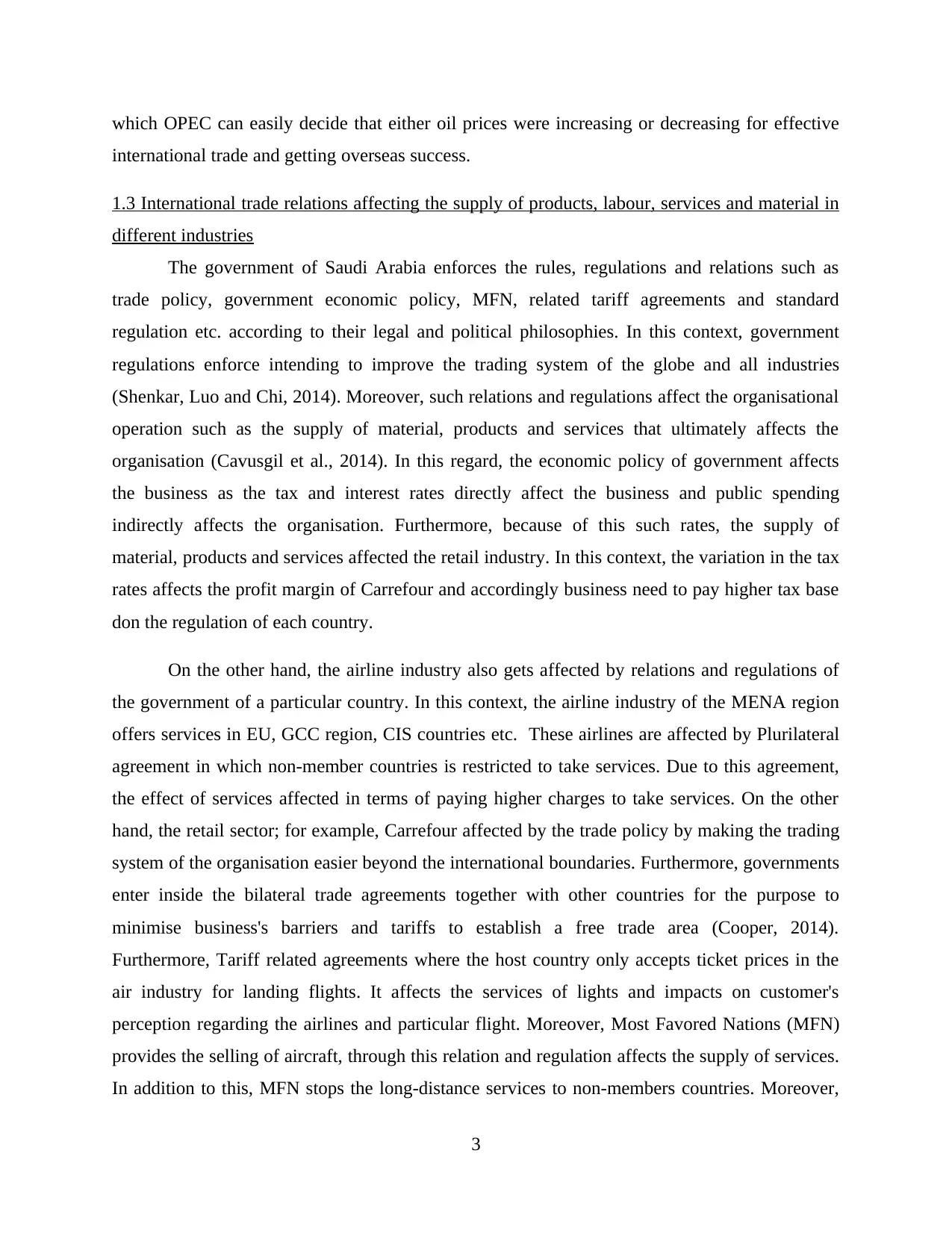
which OPEC can easily decide that either oil prices were increasing or decreasing for effective
international trade and getting overseas success.
1.3 International trade relations affecting the supply of products, labour, services and material in
different industries
The government of Saudi Arabia enforces the rules, regulations and relations such as
trade policy, government economic policy, MFN, related tariff agreements and standard
regulation etc. according to their legal and political philosophies. In this context, government
regulations enforce intending to improve the trading system of the globe and all industries
(Shenkar, Luo and Chi, 2014). Moreover, such relations and regulations affect the organisational
operation such as the supply of material, products and services that ultimately affects the
organisation (Cavusgil et al., 2014). In this regard, the economic policy of government affects
the business as the tax and interest rates directly affect the business and public spending
indirectly affects the organisation. Furthermore, because of this such rates, the supply of
material, products and services affected the retail industry. In this context, the variation in the tax
rates affects the profit margin of Carrefour and accordingly business need to pay higher tax base
don the regulation of each country.
On the other hand, the airline industry also gets affected by relations and regulations of
the government of a particular country. In this context, the airline industry of the MENA region
offers services in EU, GCC region, CIS countries etc. These airlines are affected by Plurilateral
agreement in which non-member countries is restricted to take services. Due to this agreement,
the effect of services affected in terms of paying higher charges to take services. On the other
hand, the retail sector; for example, Carrefour affected by the trade policy by making the trading
system of the organisation easier beyond the international boundaries. Furthermore, governments
enter inside the bilateral trade agreements together with other countries for the purpose to
minimise business's barriers and tariffs to establish a free trade area (Cooper, 2014).
Furthermore, Tariff related agreements where the host country only accepts ticket prices in the
air industry for landing flights. It affects the services of lights and impacts on customer's
perception regarding the airlines and particular flight. Moreover, Most Favored Nations (MFN)
provides the selling of aircraft, through this relation and regulation affects the supply of services.
In addition to this, MFN stops the long-distance services to non-members countries. Moreover,
3
international trade and getting overseas success.
1.3 International trade relations affecting the supply of products, labour, services and material in
different industries
The government of Saudi Arabia enforces the rules, regulations and relations such as
trade policy, government economic policy, MFN, related tariff agreements and standard
regulation etc. according to their legal and political philosophies. In this context, government
regulations enforce intending to improve the trading system of the globe and all industries
(Shenkar, Luo and Chi, 2014). Moreover, such relations and regulations affect the organisational
operation such as the supply of material, products and services that ultimately affects the
organisation (Cavusgil et al., 2014). In this regard, the economic policy of government affects
the business as the tax and interest rates directly affect the business and public spending
indirectly affects the organisation. Furthermore, because of this such rates, the supply of
material, products and services affected the retail industry. In this context, the variation in the tax
rates affects the profit margin of Carrefour and accordingly business need to pay higher tax base
don the regulation of each country.
On the other hand, the airline industry also gets affected by relations and regulations of
the government of a particular country. In this context, the airline industry of the MENA region
offers services in EU, GCC region, CIS countries etc. These airlines are affected by Plurilateral
agreement in which non-member countries is restricted to take services. Due to this agreement,
the effect of services affected in terms of paying higher charges to take services. On the other
hand, the retail sector; for example, Carrefour affected by the trade policy by making the trading
system of the organisation easier beyond the international boundaries. Furthermore, governments
enter inside the bilateral trade agreements together with other countries for the purpose to
minimise business's barriers and tariffs to establish a free trade area (Cooper, 2014).
Furthermore, Tariff related agreements where the host country only accepts ticket prices in the
air industry for landing flights. It affects the services of lights and impacts on customer's
perception regarding the airlines and particular flight. Moreover, Most Favored Nations (MFN)
provides the selling of aircraft, through this relation and regulation affects the supply of services.
In addition to this, MFN stops the long-distance services to non-members countries. Moreover,
3
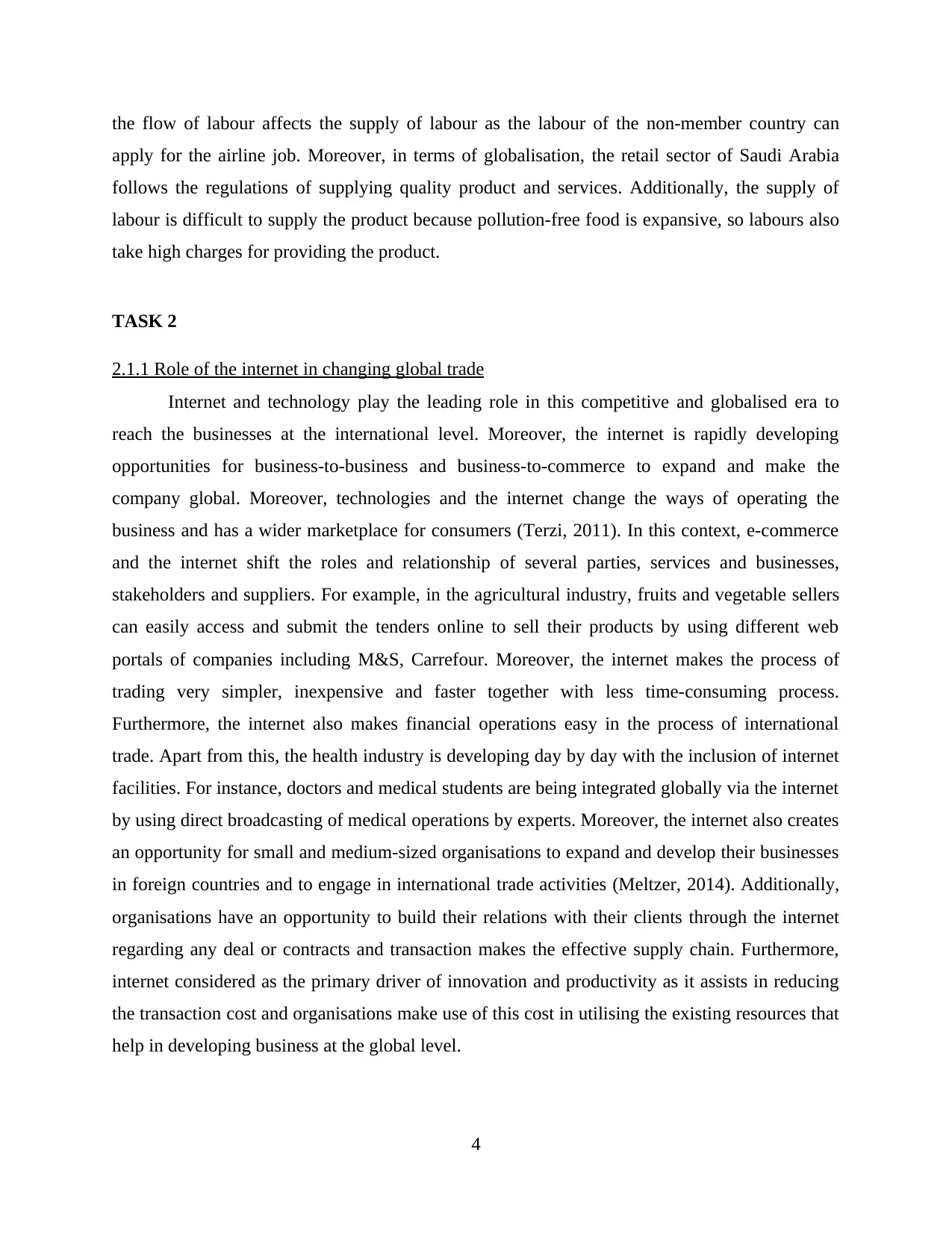
the flow of labour affects the supply of labour as the labour of the non-member country can
apply for the airline job. Moreover, in terms of globalisation, the retail sector of Saudi Arabia
follows the regulations of supplying quality product and services. Additionally, the supply of
labour is difficult to supply the product because pollution-free food is expansive, so labours also
take high charges for providing the product.
TASK 2
2.1.1 Role of the internet in changing global trade
Internet and technology play the leading role in this competitive and globalised era to
reach the businesses at the international level. Moreover, the internet is rapidly developing
opportunities for business-to-business and business-to-commerce to expand and make the
company global. Moreover, technologies and the internet change the ways of operating the
business and has a wider marketplace for consumers (Terzi, 2011). In this context, e-commerce
and the internet shift the roles and relationship of several parties, services and businesses,
stakeholders and suppliers. For example, in the agricultural industry, fruits and vegetable sellers
can easily access and submit the tenders online to sell their products by using different web
portals of companies including M&S, Carrefour. Moreover, the internet makes the process of
trading very simpler, inexpensive and faster together with less time-consuming process.
Furthermore, the internet also makes financial operations easy in the process of international
trade. Apart from this, the health industry is developing day by day with the inclusion of internet
facilities. For instance, doctors and medical students are being integrated globally via the internet
by using direct broadcasting of medical operations by experts. Moreover, the internet also creates
an opportunity for small and medium-sized organisations to expand and develop their businesses
in foreign countries and to engage in international trade activities (Meltzer, 2014). Additionally,
organisations have an opportunity to build their relations with their clients through the internet
regarding any deal or contracts and transaction makes the effective supply chain. Furthermore,
internet considered as the primary driver of innovation and productivity as it assists in reducing
the transaction cost and organisations make use of this cost in utilising the existing resources that
help in developing business at the global level.
4
apply for the airline job. Moreover, in terms of globalisation, the retail sector of Saudi Arabia
follows the regulations of supplying quality product and services. Additionally, the supply of
labour is difficult to supply the product because pollution-free food is expansive, so labours also
take high charges for providing the product.
TASK 2
2.1.1 Role of the internet in changing global trade
Internet and technology play the leading role in this competitive and globalised era to
reach the businesses at the international level. Moreover, the internet is rapidly developing
opportunities for business-to-business and business-to-commerce to expand and make the
company global. Moreover, technologies and the internet change the ways of operating the
business and has a wider marketplace for consumers (Terzi, 2011). In this context, e-commerce
and the internet shift the roles and relationship of several parties, services and businesses,
stakeholders and suppliers. For example, in the agricultural industry, fruits and vegetable sellers
can easily access and submit the tenders online to sell their products by using different web
portals of companies including M&S, Carrefour. Moreover, the internet makes the process of
trading very simpler, inexpensive and faster together with less time-consuming process.
Furthermore, the internet also makes financial operations easy in the process of international
trade. Apart from this, the health industry is developing day by day with the inclusion of internet
facilities. For instance, doctors and medical students are being integrated globally via the internet
by using direct broadcasting of medical operations by experts. Moreover, the internet also creates
an opportunity for small and medium-sized organisations to expand and develop their businesses
in foreign countries and to engage in international trade activities (Meltzer, 2014). Additionally,
organisations have an opportunity to build their relations with their clients through the internet
regarding any deal or contracts and transaction makes the effective supply chain. Furthermore,
internet considered as the primary driver of innovation and productivity as it assists in reducing
the transaction cost and organisations make use of this cost in utilising the existing resources that
help in developing business at the global level.
4
⊘ This is a preview!⊘
Do you want full access?
Subscribe today to unlock all pages.

Trusted by 1+ million students worldwide
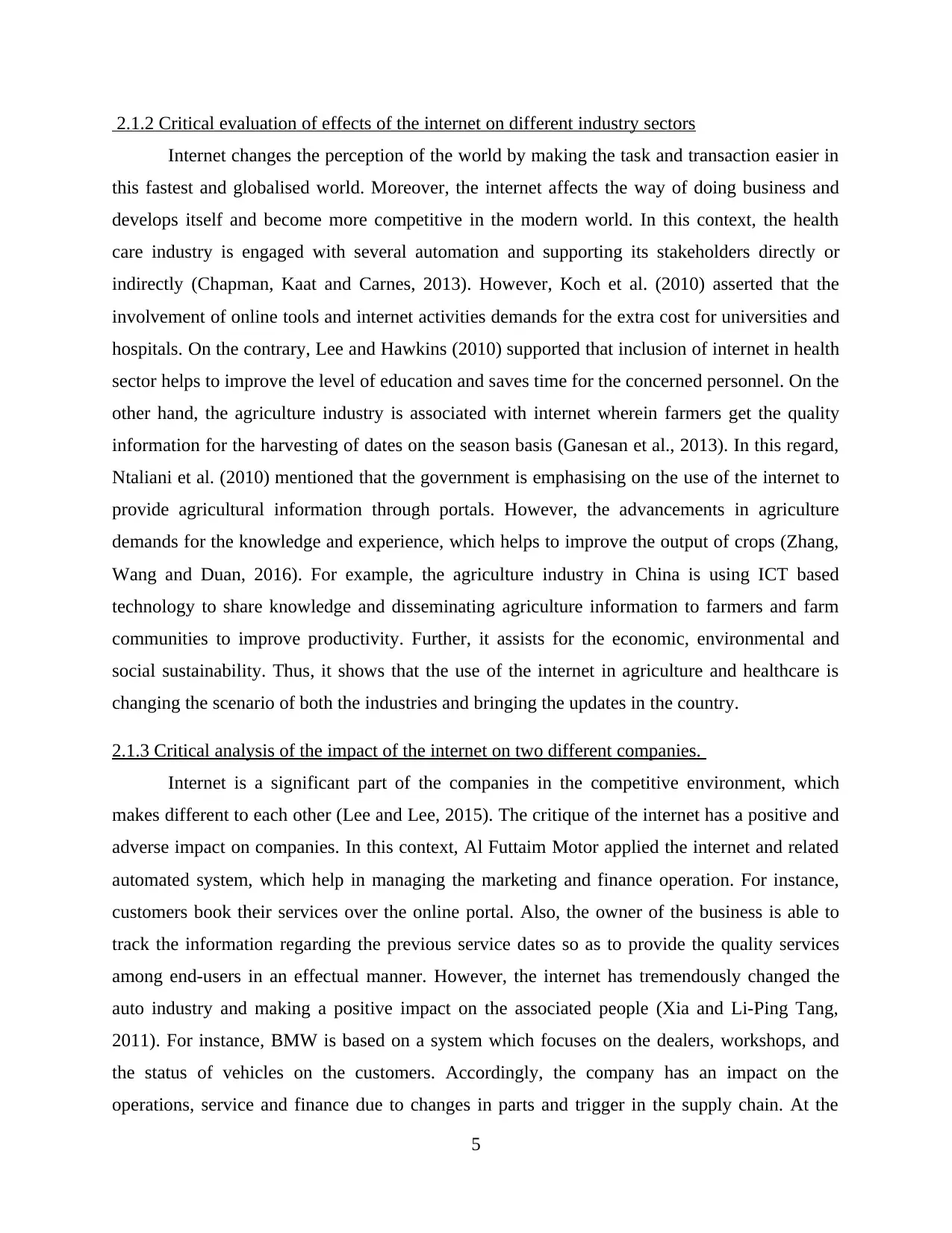
2.1.2 Critical evaluation of effects of the internet on different industry sectors
Internet changes the perception of the world by making the task and transaction easier in
this fastest and globalised world. Moreover, the internet affects the way of doing business and
develops itself and become more competitive in the modern world. In this context, the health
care industry is engaged with several automation and supporting its stakeholders directly or
indirectly (Chapman, Kaat and Carnes, 2013). However, Koch et al. (2010) asserted that the
involvement of online tools and internet activities demands for the extra cost for universities and
hospitals. On the contrary, Lee and Hawkins (2010) supported that inclusion of internet in health
sector helps to improve the level of education and saves time for the concerned personnel. On the
other hand, the agriculture industry is associated with internet wherein farmers get the quality
information for the harvesting of dates on the season basis (Ganesan et al., 2013). In this regard,
Ntaliani et al. (2010) mentioned that the government is emphasising on the use of the internet to
provide agricultural information through portals. However, the advancements in agriculture
demands for the knowledge and experience, which helps to improve the output of crops (Zhang,
Wang and Duan, 2016). For example, the agriculture industry in China is using ICT based
technology to share knowledge and disseminating agriculture information to farmers and farm
communities to improve productivity. Further, it assists for the economic, environmental and
social sustainability. Thus, it shows that the use of the internet in agriculture and healthcare is
changing the scenario of both the industries and bringing the updates in the country.
2.1.3 Critical analysis of the impact of the internet on two different companies.
Internet is a significant part of the companies in the competitive environment, which
makes different to each other (Lee and Lee, 2015). The critique of the internet has a positive and
adverse impact on companies. In this context, Al Futtaim Motor applied the internet and related
automated system, which help in managing the marketing and finance operation. For instance,
customers book their services over the online portal. Also, the owner of the business is able to
track the information regarding the previous service dates so as to provide the quality services
among end-users in an effectual manner. However, the internet has tremendously changed the
auto industry and making a positive impact on the associated people (Xia and Li-Ping Tang,
2011). For instance, BMW is based on a system which focuses on the dealers, workshops, and
the status of vehicles on the customers. Accordingly, the company has an impact on the
operations, service and finance due to changes in parts and trigger in the supply chain. At the
5
Internet changes the perception of the world by making the task and transaction easier in
this fastest and globalised world. Moreover, the internet affects the way of doing business and
develops itself and become more competitive in the modern world. In this context, the health
care industry is engaged with several automation and supporting its stakeholders directly or
indirectly (Chapman, Kaat and Carnes, 2013). However, Koch et al. (2010) asserted that the
involvement of online tools and internet activities demands for the extra cost for universities and
hospitals. On the contrary, Lee and Hawkins (2010) supported that inclusion of internet in health
sector helps to improve the level of education and saves time for the concerned personnel. On the
other hand, the agriculture industry is associated with internet wherein farmers get the quality
information for the harvesting of dates on the season basis (Ganesan et al., 2013). In this regard,
Ntaliani et al. (2010) mentioned that the government is emphasising on the use of the internet to
provide agricultural information through portals. However, the advancements in agriculture
demands for the knowledge and experience, which helps to improve the output of crops (Zhang,
Wang and Duan, 2016). For example, the agriculture industry in China is using ICT based
technology to share knowledge and disseminating agriculture information to farmers and farm
communities to improve productivity. Further, it assists for the economic, environmental and
social sustainability. Thus, it shows that the use of the internet in agriculture and healthcare is
changing the scenario of both the industries and bringing the updates in the country.
2.1.3 Critical analysis of the impact of the internet on two different companies.
Internet is a significant part of the companies in the competitive environment, which
makes different to each other (Lee and Lee, 2015). The critique of the internet has a positive and
adverse impact on companies. In this context, Al Futtaim Motor applied the internet and related
automated system, which help in managing the marketing and finance operation. For instance,
customers book their services over the online portal. Also, the owner of the business is able to
track the information regarding the previous service dates so as to provide the quality services
among end-users in an effectual manner. However, the internet has tremendously changed the
auto industry and making a positive impact on the associated people (Xia and Li-Ping Tang,
2011). For instance, BMW is based on a system which focuses on the dealers, workshops, and
the status of vehicles on the customers. Accordingly, the company has an impact on the
operations, service and finance due to changes in parts and trigger in the supply chain. At the
5
Paraphrase This Document
Need a fresh take? Get an instant paraphrase of this document with our AI Paraphraser
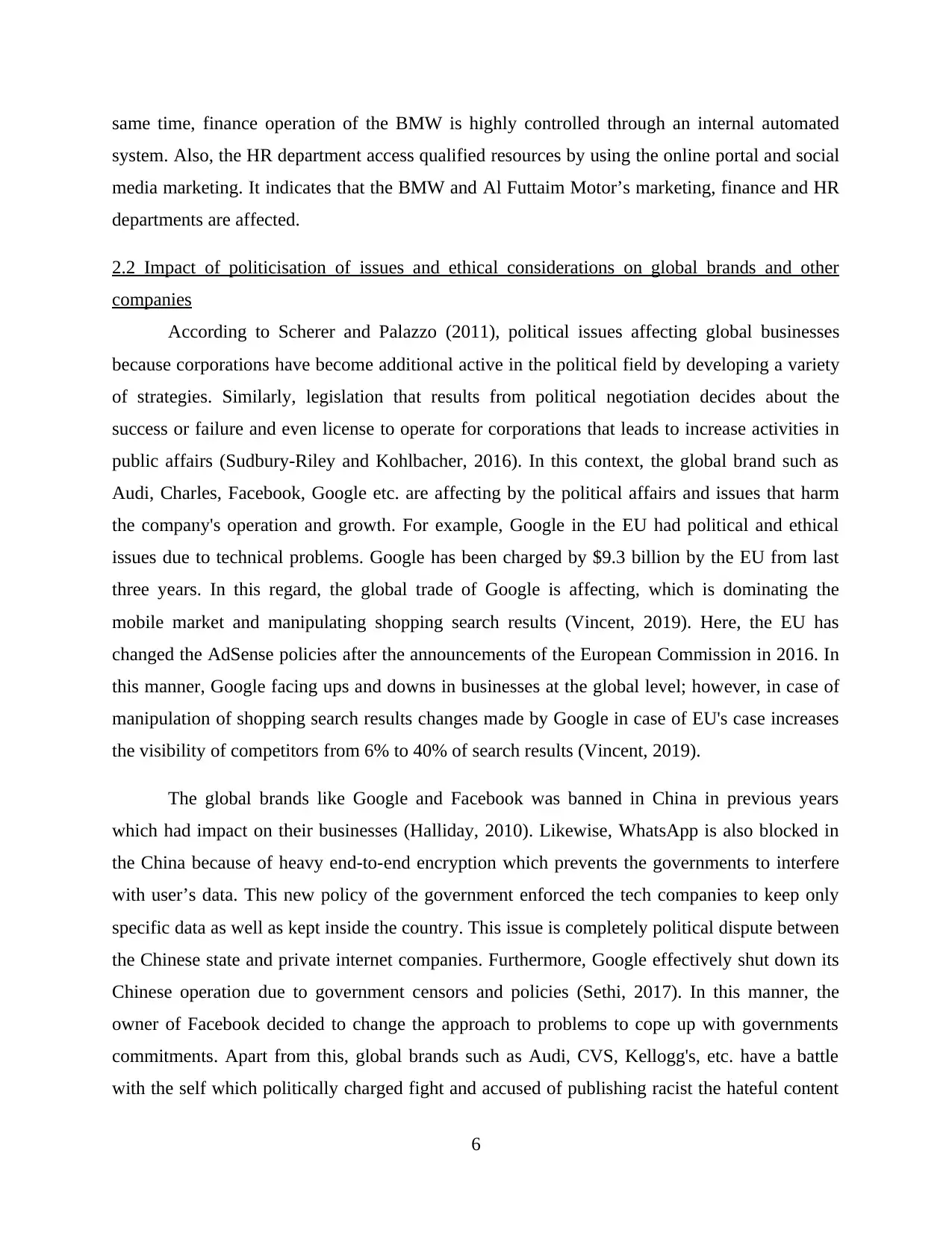
same time, finance operation of the BMW is highly controlled through an internal automated
system. Also, the HR department access qualified resources by using the online portal and social
media marketing. It indicates that the BMW and Al Futtaim Motor’s marketing, finance and HR
departments are affected.
2.2 Impact of politicisation of issues and ethical considerations on global brands and other
companies
According to Scherer and Palazzo (2011), political issues affecting global businesses
because corporations have become additional active in the political field by developing a variety
of strategies. Similarly, legislation that results from political negotiation decides about the
success or failure and even license to operate for corporations that leads to increase activities in
public affairs (Sudbury-Riley and Kohlbacher, 2016). In this context, the global brand such as
Audi, Charles, Facebook, Google etc. are affecting by the political affairs and issues that harm
the company's operation and growth. For example, Google in the EU had political and ethical
issues due to technical problems. Google has been charged by $9.3 billion by the EU from last
three years. In this regard, the global trade of Google is affecting, which is dominating the
mobile market and manipulating shopping search results (Vincent, 2019). Here, the EU has
changed the AdSense policies after the announcements of the European Commission in 2016. In
this manner, Google facing ups and downs in businesses at the global level; however, in case of
manipulation of shopping search results changes made by Google in case of EU's case increases
the visibility of competitors from 6% to 40% of search results (Vincent, 2019).
The global brands like Google and Facebook was banned in China in previous years
which had impact on their businesses (Halliday, 2010). Likewise, WhatsApp is also blocked in
the China because of heavy end-to-end encryption which prevents the governments to interfere
with user’s data. This new policy of the government enforced the tech companies to keep only
specific data as well as kept inside the country. This issue is completely political dispute between
the Chinese state and private internet companies. Furthermore, Google effectively shut down its
Chinese operation due to government censors and policies (Sethi, 2017). In this manner, the
owner of Facebook decided to change the approach to problems to cope up with governments
commitments. Apart from this, global brands such as Audi, CVS, Kellogg's, etc. have a battle
with the self which politically charged fight and accused of publishing racist the hateful content
6
system. Also, the HR department access qualified resources by using the online portal and social
media marketing. It indicates that the BMW and Al Futtaim Motor’s marketing, finance and HR
departments are affected.
2.2 Impact of politicisation of issues and ethical considerations on global brands and other
companies
According to Scherer and Palazzo (2011), political issues affecting global businesses
because corporations have become additional active in the political field by developing a variety
of strategies. Similarly, legislation that results from political negotiation decides about the
success or failure and even license to operate for corporations that leads to increase activities in
public affairs (Sudbury-Riley and Kohlbacher, 2016). In this context, the global brand such as
Audi, Charles, Facebook, Google etc. are affecting by the political affairs and issues that harm
the company's operation and growth. For example, Google in the EU had political and ethical
issues due to technical problems. Google has been charged by $9.3 billion by the EU from last
three years. In this regard, the global trade of Google is affecting, which is dominating the
mobile market and manipulating shopping search results (Vincent, 2019). Here, the EU has
changed the AdSense policies after the announcements of the European Commission in 2016. In
this manner, Google facing ups and downs in businesses at the global level; however, in case of
manipulation of shopping search results changes made by Google in case of EU's case increases
the visibility of competitors from 6% to 40% of search results (Vincent, 2019).
The global brands like Google and Facebook was banned in China in previous years
which had impact on their businesses (Halliday, 2010). Likewise, WhatsApp is also blocked in
the China because of heavy end-to-end encryption which prevents the governments to interfere
with user’s data. This new policy of the government enforced the tech companies to keep only
specific data as well as kept inside the country. This issue is completely political dispute between
the Chinese state and private internet companies. Furthermore, Google effectively shut down its
Chinese operation due to government censors and policies (Sethi, 2017). In this manner, the
owner of Facebook decided to change the approach to problems to cope up with governments
commitments. Apart from this, global brands such as Audi, CVS, Kellogg's, etc. have a battle
with the self which politically charged fight and accused of publishing racist the hateful content
6
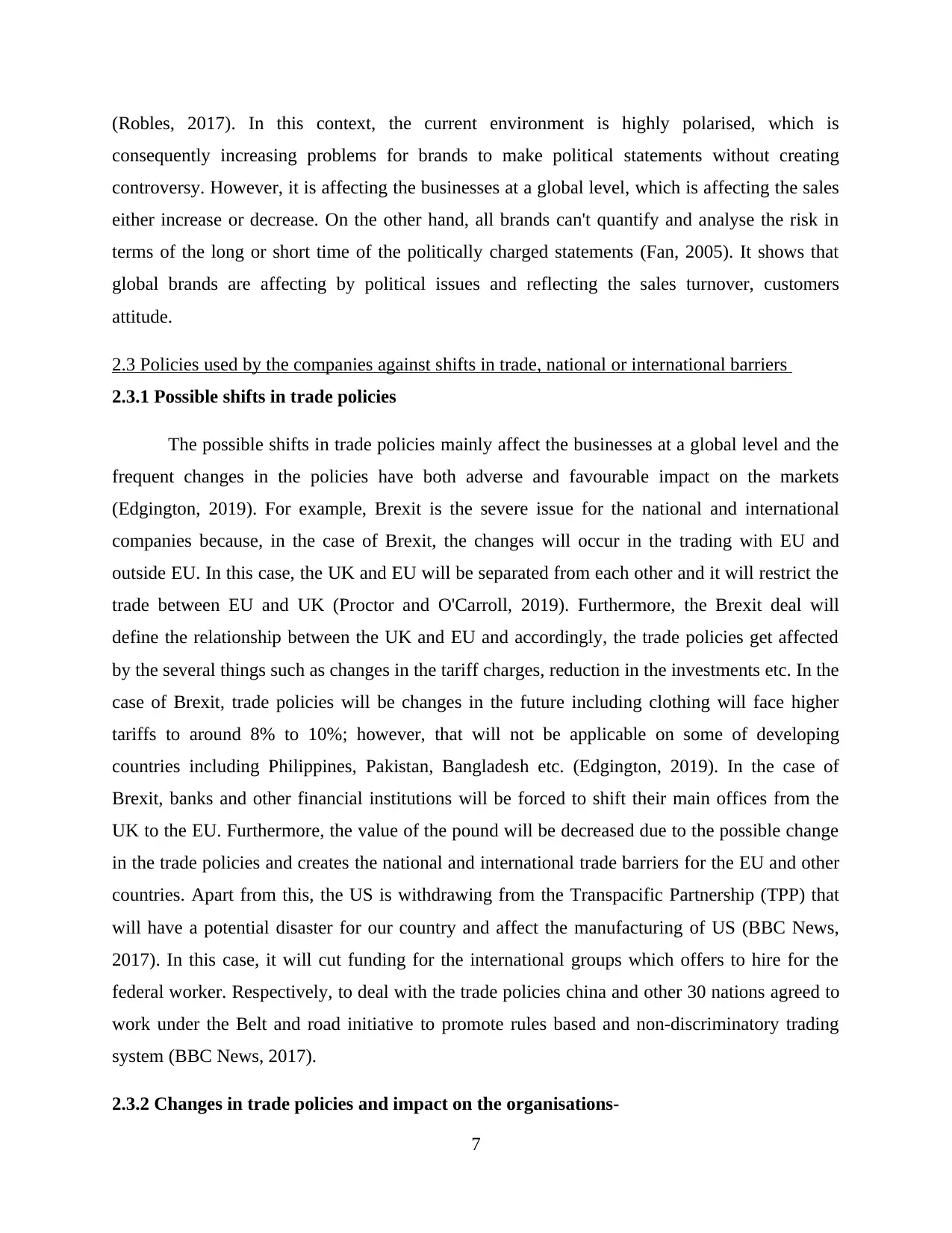
(Robles, 2017). In this context, the current environment is highly polarised, which is
consequently increasing problems for brands to make political statements without creating
controversy. However, it is affecting the businesses at a global level, which is affecting the sales
either increase or decrease. On the other hand, all brands can't quantify and analyse the risk in
terms of the long or short time of the politically charged statements (Fan, 2005). It shows that
global brands are affecting by political issues and reflecting the sales turnover, customers
attitude.
2.3 Policies used by the companies against shifts in trade, national or international barriers
2.3.1 Possible shifts in trade policies
The possible shifts in trade policies mainly affect the businesses at a global level and the
frequent changes in the policies have both adverse and favourable impact on the markets
(Edgington, 2019). For example, Brexit is the severe issue for the national and international
companies because, in the case of Brexit, the changes will occur in the trading with EU and
outside EU. In this case, the UK and EU will be separated from each other and it will restrict the
trade between EU and UK (Proctor and O'Carroll, 2019). Furthermore, the Brexit deal will
define the relationship between the UK and EU and accordingly, the trade policies get affected
by the several things such as changes in the tariff charges, reduction in the investments etc. In the
case of Brexit, trade policies will be changes in the future including clothing will face higher
tariffs to around 8% to 10%; however, that will not be applicable on some of developing
countries including Philippines, Pakistan, Bangladesh etc. (Edgington, 2019). In the case of
Brexit, banks and other financial institutions will be forced to shift their main offices from the
UK to the EU. Furthermore, the value of the pound will be decreased due to the possible change
in the trade policies and creates the national and international trade barriers for the EU and other
countries. Apart from this, the US is withdrawing from the Transpacific Partnership (TPP) that
will have a potential disaster for our country and affect the manufacturing of US (BBC News,
2017). In this case, it will cut funding for the international groups which offers to hire for the
federal worker. Respectively, to deal with the trade policies china and other 30 nations agreed to
work under the Belt and road initiative to promote rules based and non-discriminatory trading
system (BBC News, 2017).
2.3.2 Changes in trade policies and impact on the organisations-
7
consequently increasing problems for brands to make political statements without creating
controversy. However, it is affecting the businesses at a global level, which is affecting the sales
either increase or decrease. On the other hand, all brands can't quantify and analyse the risk in
terms of the long or short time of the politically charged statements (Fan, 2005). It shows that
global brands are affecting by political issues and reflecting the sales turnover, customers
attitude.
2.3 Policies used by the companies against shifts in trade, national or international barriers
2.3.1 Possible shifts in trade policies
The possible shifts in trade policies mainly affect the businesses at a global level and the
frequent changes in the policies have both adverse and favourable impact on the markets
(Edgington, 2019). For example, Brexit is the severe issue for the national and international
companies because, in the case of Brexit, the changes will occur in the trading with EU and
outside EU. In this case, the UK and EU will be separated from each other and it will restrict the
trade between EU and UK (Proctor and O'Carroll, 2019). Furthermore, the Brexit deal will
define the relationship between the UK and EU and accordingly, the trade policies get affected
by the several things such as changes in the tariff charges, reduction in the investments etc. In the
case of Brexit, trade policies will be changes in the future including clothing will face higher
tariffs to around 8% to 10%; however, that will not be applicable on some of developing
countries including Philippines, Pakistan, Bangladesh etc. (Edgington, 2019). In the case of
Brexit, banks and other financial institutions will be forced to shift their main offices from the
UK to the EU. Furthermore, the value of the pound will be decreased due to the possible change
in the trade policies and creates the national and international trade barriers for the EU and other
countries. Apart from this, the US is withdrawing from the Transpacific Partnership (TPP) that
will have a potential disaster for our country and affect the manufacturing of US (BBC News,
2017). In this case, it will cut funding for the international groups which offers to hire for the
federal worker. Respectively, to deal with the trade policies china and other 30 nations agreed to
work under the Belt and road initiative to promote rules based and non-discriminatory trading
system (BBC News, 2017).
2.3.2 Changes in trade policies and impact on the organisations-
7
⊘ This is a preview!⊘
Do you want full access?
Subscribe today to unlock all pages.

Trusted by 1+ million students worldwide
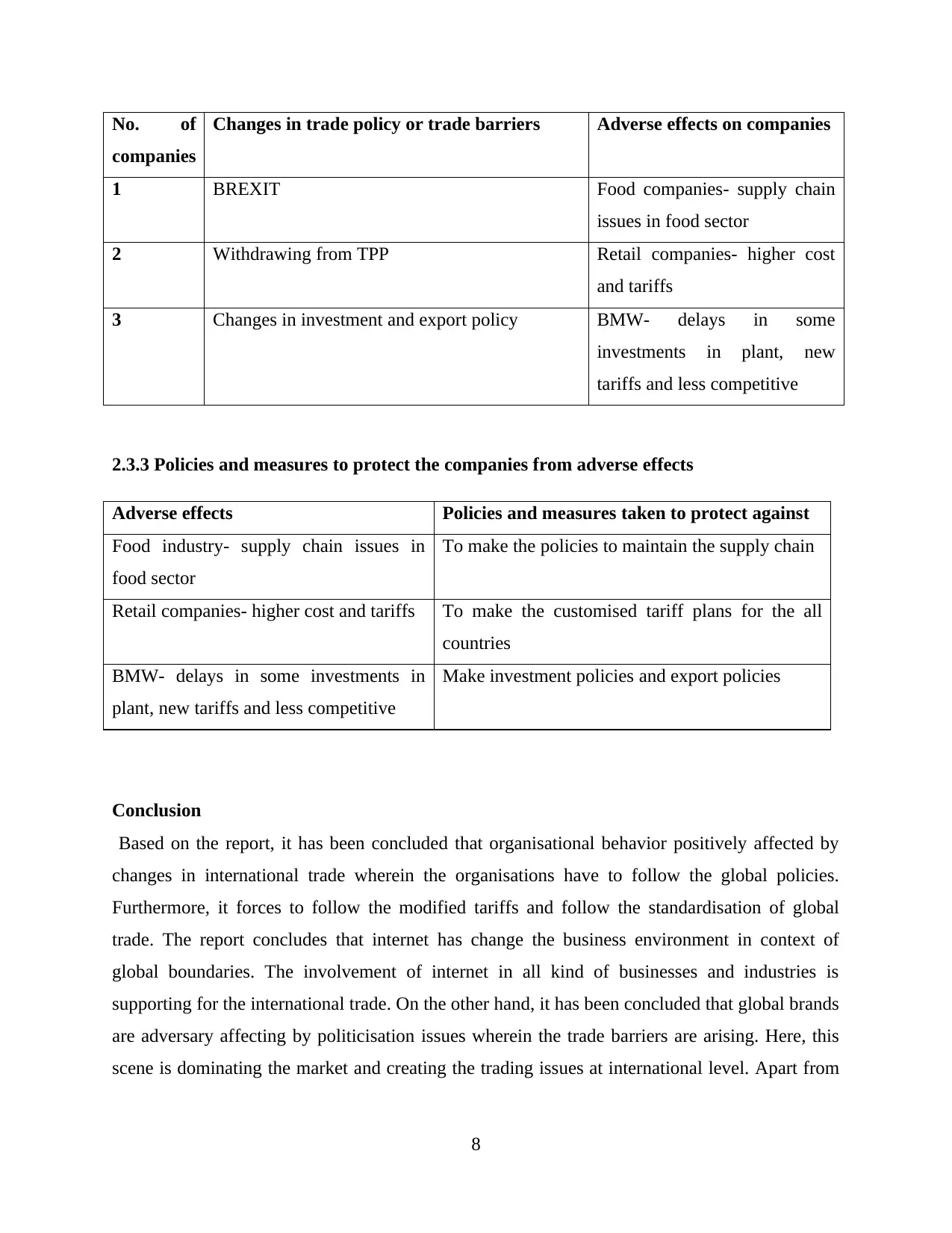
No. of
companies
Changes in trade policy or trade barriers Adverse effects on companies
1 BREXIT Food companies- supply chain
issues in food sector
2 Withdrawing from TPP Retail companies- higher cost
and tariffs
3 Changes in investment and export policy BMW- delays in some
investments in plant, new
tariffs and less competitive
2.3.3 Policies and measures to protect the companies from adverse effects
Adverse effects Policies and measures taken to protect against
Food industry- supply chain issues in
food sector
To make the policies to maintain the supply chain
Retail companies- higher cost and tariffs To make the customised tariff plans for the all
countries
BMW- delays in some investments in
plant, new tariffs and less competitive
Make investment policies and export policies
Conclusion
Based on the report, it has been concluded that organisational behavior positively affected by
changes in international trade wherein the organisations have to follow the global policies.
Furthermore, it forces to follow the modified tariffs and follow the standardisation of global
trade. The report concludes that internet has change the business environment in context of
global boundaries. The involvement of internet in all kind of businesses and industries is
supporting for the international trade. On the other hand, it has been concluded that global brands
are adversary affecting by politicisation issues wherein the trade barriers are arising. Here, this
scene is dominating the market and creating the trading issues at international level. Apart from
8
companies
Changes in trade policy or trade barriers Adverse effects on companies
1 BREXIT Food companies- supply chain
issues in food sector
2 Withdrawing from TPP Retail companies- higher cost
and tariffs
3 Changes in investment and export policy BMW- delays in some
investments in plant, new
tariffs and less competitive
2.3.3 Policies and measures to protect the companies from adverse effects
Adverse effects Policies and measures taken to protect against
Food industry- supply chain issues in
food sector
To make the policies to maintain the supply chain
Retail companies- higher cost and tariffs To make the customised tariff plans for the all
countries
BMW- delays in some investments in
plant, new tariffs and less competitive
Make investment policies and export policies
Conclusion
Based on the report, it has been concluded that organisational behavior positively affected by
changes in international trade wherein the organisations have to follow the global policies.
Furthermore, it forces to follow the modified tariffs and follow the standardisation of global
trade. The report concludes that internet has change the business environment in context of
global boundaries. The involvement of internet in all kind of businesses and industries is
supporting for the international trade. On the other hand, it has been concluded that global brands
are adversary affecting by politicisation issues wherein the trade barriers are arising. Here, this
scene is dominating the market and creating the trading issues at international level. Apart from
8
Paraphrase This Document
Need a fresh take? Get an instant paraphrase of this document with our AI Paraphraser
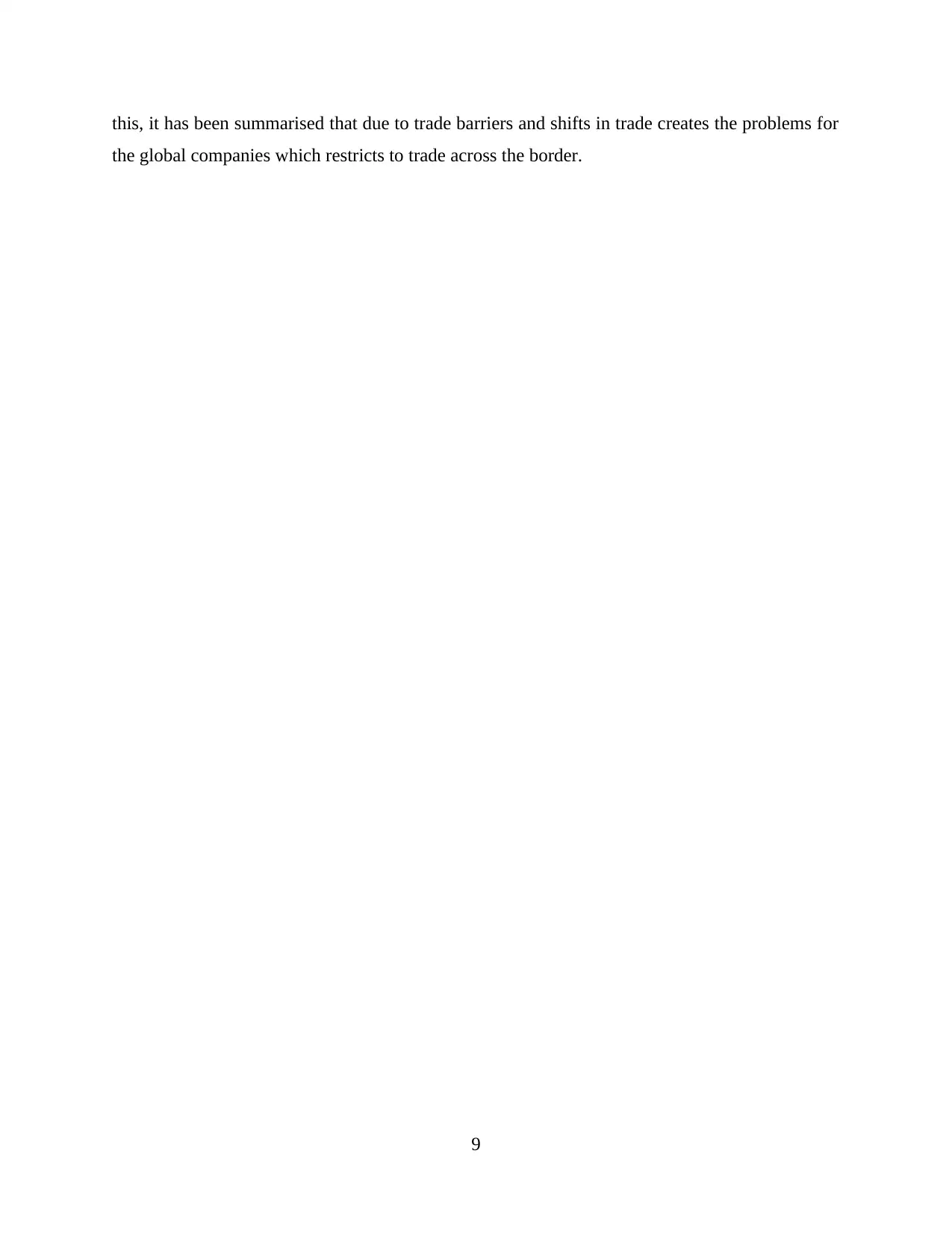
this, it has been summarised that due to trade barriers and shifts in trade creates the problems for
the global companies which restricts to trade across the border.
9
the global companies which restricts to trade across the border.
9
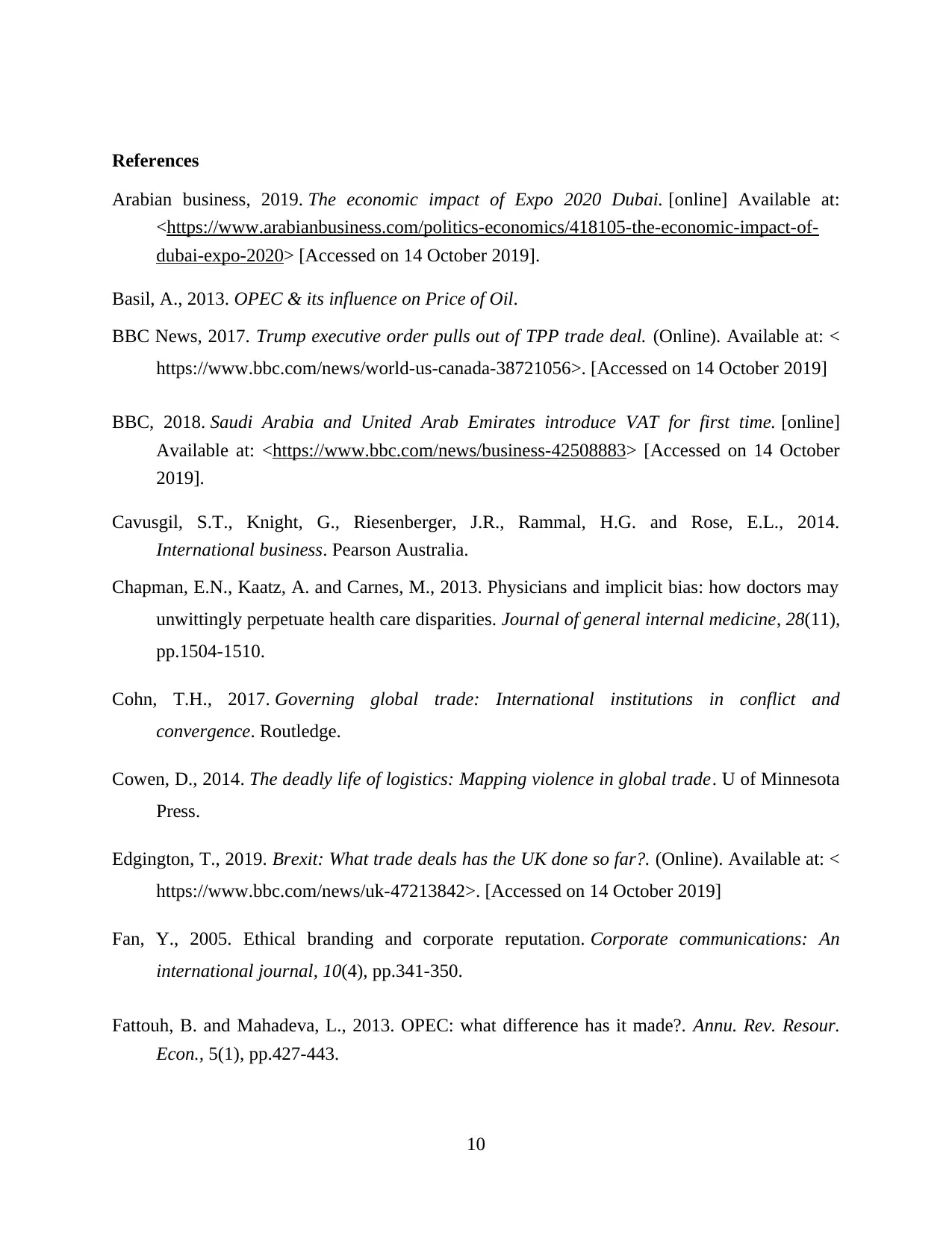
References
Arabian business, 2019. The economic impact of Expo 2020 Dubai. [online] Available at:
<https://www.arabianbusiness.com/politics-economics/418105-the-economic-impact-of-
dubai-expo-2020> [Accessed on 14 October 2019].
Basil, A., 2013. OPEC & its influence on Price of Oil.
BBC News, 2017. Trump executive order pulls out of TPP trade deal. (Online). Available at: <
https://www.bbc.com/news/world-us-canada-38721056>. [Accessed on 14 October 2019]
BBC, 2018. Saudi Arabia and United Arab Emirates introduce VAT for first time. [online]
Available at: <https://www.bbc.com/news/business-42508883> [Accessed on 14 October
2019].
Cavusgil, S.T., Knight, G., Riesenberger, J.R., Rammal, H.G. and Rose, E.L., 2014.
International business. Pearson Australia.
Chapman, E.N., Kaatz, A. and Carnes, M., 2013. Physicians and implicit bias: how doctors may
unwittingly perpetuate health care disparities. Journal of general internal medicine, 28(11),
pp.1504-1510.
Cohn, T.H., 2017. Governing global trade: International institutions in conflict and
convergence. Routledge.
Cowen, D., 2014. The deadly life of logistics: Mapping violence in global trade. U of Minnesota
Press.
Edgington, T., 2019. Brexit: What trade deals has the UK done so far?. (Online). Available at: <
https://www.bbc.com/news/uk-47213842>. [Accessed on 14 October 2019]
Fan, Y., 2005. Ethical branding and corporate reputation. Corporate communications: An
international journal, 10(4), pp.341-350.
Fattouh, B. and Mahadeva, L., 2013. OPEC: what difference has it made?. Annu. Rev. Resour.
Econ., 5(1), pp.427-443.
10
Arabian business, 2019. The economic impact of Expo 2020 Dubai. [online] Available at:
<https://www.arabianbusiness.com/politics-economics/418105-the-economic-impact-of-
dubai-expo-2020> [Accessed on 14 October 2019].
Basil, A., 2013. OPEC & its influence on Price of Oil.
BBC News, 2017. Trump executive order pulls out of TPP trade deal. (Online). Available at: <
https://www.bbc.com/news/world-us-canada-38721056>. [Accessed on 14 October 2019]
BBC, 2018. Saudi Arabia and United Arab Emirates introduce VAT for first time. [online]
Available at: <https://www.bbc.com/news/business-42508883> [Accessed on 14 October
2019].
Cavusgil, S.T., Knight, G., Riesenberger, J.R., Rammal, H.G. and Rose, E.L., 2014.
International business. Pearson Australia.
Chapman, E.N., Kaatz, A. and Carnes, M., 2013. Physicians and implicit bias: how doctors may
unwittingly perpetuate health care disparities. Journal of general internal medicine, 28(11),
pp.1504-1510.
Cohn, T.H., 2017. Governing global trade: International institutions in conflict and
convergence. Routledge.
Cowen, D., 2014. The deadly life of logistics: Mapping violence in global trade. U of Minnesota
Press.
Edgington, T., 2019. Brexit: What trade deals has the UK done so far?. (Online). Available at: <
https://www.bbc.com/news/uk-47213842>. [Accessed on 14 October 2019]
Fan, Y., 2005. Ethical branding and corporate reputation. Corporate communications: An
international journal, 10(4), pp.341-350.
Fattouh, B. and Mahadeva, L., 2013. OPEC: what difference has it made?. Annu. Rev. Resour.
Econ., 5(1), pp.427-443.
10
⊘ This is a preview!⊘
Do you want full access?
Subscribe today to unlock all pages.

Trusted by 1+ million students worldwide
1 out of 15
Related Documents
Your All-in-One AI-Powered Toolkit for Academic Success.
+13062052269
info@desklib.com
Available 24*7 on WhatsApp / Email
![[object Object]](/_next/static/media/star-bottom.7253800d.svg)
Unlock your academic potential
Copyright © 2020–2026 A2Z Services. All Rights Reserved. Developed and managed by ZUCOL.


